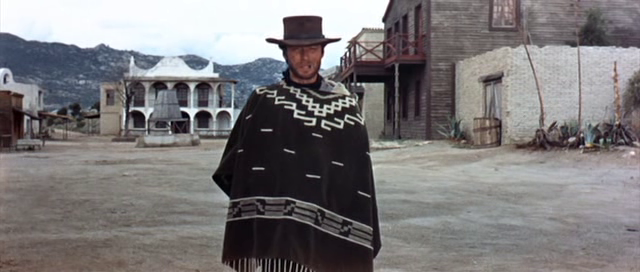Before A Fistful of Dollars, westerns were primarily an American genre and as with any genre it had as set of well established conventions and styles that shaped how most American made westerns were. While westerns were not exclusively made in the United States, the genre was largely dominated by the American film industry until Sergio Leone made A Fistful of Dollars in 1964. Sergio Leone set out to make his movie at the time where the western genre was winding down and the Hollywood westerns had become nearly stagnant and lacked originality. While the western genre may have been dying in America, Leone saw that the audience was still there in Europe, and set out to revitalize the genre by inserting Italian film styles and subjects into a western setting. The result was the success of A Fistful of Dollars and the birth of the Spaghetti Western sub-genre.
Although, like most innovative genre redefining movies, A Fistful of Dollars was not entirely appreciated or accepted when it came out. However, it didn't take long for many other European directors to begin copying Sergio Leone's style to varying degrees of success. Eitherway, it seemed that Leone had successfully given birth to a sub-genre that would last for nearly two decades. While Spaghetti Western may have been a derogatory term first coined for the genre, as critics claimed that the Spaghetti Western was inferior to the American Westerns, it has since been embraced and the genre still has much influence today.
 |
| Real men wear ponchos. |
It is because of they are low budget, Italian productions that I had never actually thought that any of Clint Eastwood's movies fell into the category of Spaghetti Westerns. I only really know Clint Eastwood for his iconic macho man reputation, and so I always assumed he was jut an American star. However, he is actually an international icon and got his big start in A Fistful of Dollars. It is interesting to think that such a star got his start on an Italian production where the only way he could communicate with the director and most of the crew was threw the stunman/unofficial translator. While Eastwood wasn't Leone's first choice, he reportedly took to Eastwood's distinctive style quickly and commented that, "I like Clint Eastwood because he has only two facial expressions: one with the hat, and one without it."" If you only take one thing from A Fistful of Dollars, it is that Clint Eastwood is a badass now, and he was a badass then.
 |
Also to be heard again is Ennio Morricone, who composed the soundtrack to A Fistful of Dollars as well as the rest of the trilogy and many other Spaghetti Westerns. The soundtrack to the film was an important part of the film for Sergio Leone, and the reason many scenes play out so long is because he didn't want the music to end. Some argue that A Fistful of Dollars plays out like an opera, and Sergio Leone himself has said that he wanted his western to have an operatic feel which is why you find yourself listening mostly to the music as the dubbed dialogue is rather sparse. The music is used extremely well to set the tone and and atmosphere and always triggers anticipation as the tension builds before action sequences, which are more violent than typical westerns.
 |
| I feel like some cast member did this as a joke and it just stuck. |
they still had a great influence on cinema, and we are about to see Quentin Tarantino's homage to the sub-genre in his upcoming film Django Unchained. Seems like a good time to take a look at the genre, as I tend to always watch the homages first, and then go back and look at their influences.
Link:
A Fistful of Dollars IMDb






No comments:
Post a Comment